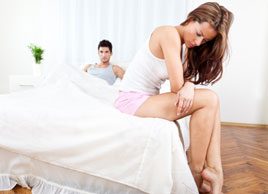What causes low sex drive?
Find out why our desire for sex changes over time, and what you can do to keep your sex life going strong

Source: Best Health Magazine, Summer 2012
The other day, a 28-year-old married patient came in for a refill of her birth control pills. As I wrapped the blood pressure cuff around her arm, she said: ‘I’m worried because I’m not interested in sex anymore. It’s been going on for a while and is starting to affect my relationship.’
I was glad she spoke up. A 2010 U.S. study by the International Society for the Study of Women’s Sexual Health found 43 percent of women over 18 experience sexual problems, with 10 percent complaining of low desire. Yet many women feel shy about sharing sex-related concerns, and I suspect many doctors forget to ask (I know I do). But their worries need to be addressed.
Desire is directly linked to our emotions, so psychological and relationship factors always need to be considered. Yet we have a rule in medicine: First, determine if there are physical causes. If your sex drive has ebbed, talk to your doctor and ask if you should have blood tests to check your hormones and rule out conditions such as anemia and diabetes. Conditions like these are fairly common but are often picked up only through blood tests. And if you don’t feel well physically, you’re usually not interested in sex.
For women over 40, where hormones are more likely to be an issue, you can always ask your doctor if he or she can refer you to a physician who focuses on women’s hormonal health, such as a gynecologist, or another GP who has made this a focus of their practice. Unfortunately, in my experience, medical schools tend not to thoroughly address the complex nature of female hormonal health. It’s challenging to interpret hormone tests without specialized training, and some experts insist that standard blood tests are not as useful as salivary or urine tests, which aren’t widely available.
One thing is for sure: Our hormones change through the decades, sometimes well before menopause.
In our 20s
In our 20s, our bodies are very sexually responsive, as hormones are at optimal levels. During this time progesterone and estrogen are balanced and these, along with testosterone, play a role in sexual arousal.
In our 30s
It’s commonly said that women peak sexually in their 30s, and while that’s true for some, for others progesterone levels begin to drop. This imbalance causes fatigue, weight gain and decreased libido.
40s and older
In our 40s we typically enter perimenopause, and estrogen levels begin to wane, further decreasing the capacity for arousal. Once we hit menopause, typically in our early 50s, libido-stimulating testosterone levels go down. Thankfully, physicians who specialize in hormonal health can help you balance these shifts.
Could the pill be the problem?
The medical cause of low desire may be simple, as was the case with my patient: The birth control pill is one of the most common offenders. It increases a testosterone-binding protein in our blood, lowering testosterone and decreasing desire. Different pills vary in their composition, so it may be worth asking your doctor to put you on a different brand. If you try a few without improvement, consider going off the pill completely’after checking with your doctor, of course. You should notice an improvement in sexual desire within three months.
But what about effective birth control?
Don’t despair; there are lots of options: Condoms come in a staggering variety (yes, even vibrating!) and, let’s face it, it’s wise to use them even when on the pill or using other methods that can expose you to sexually transmitted infections (STIs).
Depo-Provera, an injection of a hormone similar to progesterone with anti-conception effects that last for three months at a time, is another option, though there’s a risk of decreasing bone density while on it.
The intrauterine system (IUS) is similar to an intrauterine device (IUD) but with fewer associated side effects and lower risk. Both options are best suited to women in long-term monogamous relationships. This is because there’s a slightly increased risk of pelvic inflammatory disease (which can lead to infertility) for women who use them and who have multiple sexual partners. Note: The difference between an IUS and an IUD is that the IUD’s contraceptive effect comes from the copper it’s made of, while the IUS gives off a progesterone-related hormone. Some women are not able to tolerate IUDs because of heavy bleeding related to the device, while the IUS actually significantly decreases menstrual bleeding (20 percent of women using it stop menstruating altogether). My patients who use the IUS give it rave reviews. However, the IUS needs to be changed by your doctor every five years, while traditional IUDs may be left in longer.
The bottom line: Talk to your doctor if you’re having challenges with sexual desire. We want to know, and we can help you.
This article was originally titled "Why our desire for sex can change over time" in the Summer 2012 issue of Best Health. Subscribe today to get the full Best Health experience’and never miss an issue!




